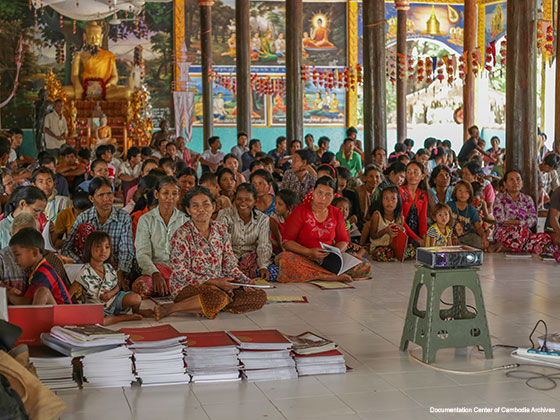|

Villagers
of Banteay Ampril District, Oddar Meanchey Province, watching a live
screening verdict of Case 002/01 in August 2014 organized by the
Documentation Center of Cambodia (DC-Cam). During the announcement of
the verdict, DC-Cam staff travelled to every corner of the country to
set up live screenings of the verdict for people who could not
otherwise hear the verdict. The verdict sentenced Khieu Samphan and
Nuon Chea to life imprisonment for crimes against humanity. Source:
Ouch Makara/Documentation Center of Cambodia Archive.
VICTIMS OF TORTURE
2003-Present
A range of affective
conditions, including trauma, is the legacy of recent political
conflicts, twenty years of civil war, the massive atrocities committed
during the Khmer Rouge years, and the grave social and economic
problems faced by thousands of Cambodians on a daily basis. DC-Cam and
the
Transcultural Psychosocial
Organization (TPO) are working together to implement
the two-year Victims of Torture (VOT) Project, which was designed to
address the trauma experienced by both the victims and perpetrators of
the Khmer Rouge.
Our work was initially
conducted in
Takeo and Kandal provinces, both of which contain a large proportion
of victims of the
Khmer Rouge. Of historical importance, both provinces were under the
control of Ta Mok (the head of the Southwest Zone during Democratic
Kampuchea and a candidate for prosecution under the Khmer Rouge
tribunal). This, plus the significant numbers of mass graves and
prisons these two provinces, provides strong evidence of large-scale
human rights abuses, including torture.
We subsequently added the
pilot area of Koh Sla in Kampot province to the project. The majority
of survivors in this region were Khmer Rouge soldiers. In addition,
Koh Sla is located in the former West Zone, a highly controlled area
under the Khmer Rouge regime.
Using the skills they have gained from TPO training and standardized
questionnaires, DC-Cam staff members identify clients for TPO.
After we identify
individuals suffering from PTSD but prior to counseling, TPO assesses
their mental health status, levels of functioning, and distress levels
using standardized questionnaires such as the WHO-Disability
Assessment Schedule 12.
Counseling began in
January 2005. Each client's history will be recorded and kept in
confidential files by TPO therapists. At the end of the project, TPO
will conduct an evaluation and write up the results in a report.
Contact:
Youk Chhang
|